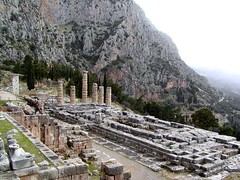Friday, March 24, 2006
Lost Civilizations: Time-Life video on Greece: A Moment of Excellence
Lost Civilizations / Greece; a moment of excellence
Answer the questions and take notes on this sheet as you watch the program. Questions are in the order as presented by Time Life.
1)The Parthenon was largely intact until the year __, when it was blown apart by a direct hit during a war. What was being stored in the Parthenon at that time?
___.
2) In the competition between city states on the Aegean, which was one was the usual winner? __
3) What nation was the mutual enemy of all Greek communities? __
4) The filmmakers call the ancient Greeks “a people with a passion for __.”
5) The Parthenon was built at a huge cost to the people of Athens. Who was the leader who oversaw this construction? __
6) How did the government pay for the expenses of building the Parthenon?
A: Taxes on __ .
7) The Parthenon might be compared in several ways to notable buildings in Manhattan. Which building(s)?
8) About how many years were spanned in the construction of the Parthenon?
9) The great leader Pericles married the well-known beauty Aspasia. What kind of female was she? __
10) The Greeks gave us concepts and words such as philo__, pol__, geo__
and bio__.
11) Greek observations and math enabled them to calculate the celestial position of the __ and __.
12) Greek scientists gave us the idea of the smallest particle of matter, the __.
13) Hippocrates was the father of __.
14) Greeks first actuated the mechanisms of this form of government: __.
15) The American founding fathers knew the importance of classical studies. Typically, men like Washington and Jefferson had studied the languages of __ and __.
16) In Athens there was the freedom to have public debate and to let the __ rule.
17) The temple was not simply the site of quiet prayer; on the outside the priests performed bloody __.
18) In a seafaring nation such as Greece the God of the Sea was paramount. He was called __.
19) A famous bronze statue of the sea deity was taken away in a ship (one sunk by a storm) by the conquerors of Greece, the __.
20) On Mt Olympus lived the gods. An array of the gods - “across the gods” - was called a p__.
21) The most important sanctuary of the gods was not in Athens. It was a site called __.
22) At this site the people performed plays, debates and readings to honor the god __, whose temple was near by.
23) In Delphi was a figure of wisdom who would offer answers to life’s difficult questions. This source of wisdom was known as the __.
24) A __ was used as the anonymous mouth of the wise responses.
25) Answers given by this fount of wisdom were not direct and clear. They were open to interpretation, or __.
26) Also near Delphi was Mt Parnassus, where rites were undertaken by women enthralled by the god of wine, __.
27) Drama originated as a holy activity in Dionysian __ festivals.
28) The Greek actress introduced by the program is set to play a tragedy about a woman’s passion unleashed. The play is called __.
29) The group on a Greek stage that represents the common people is called the __.
30) The tragic heroine Medea kills her __.
1. 1687 2. Athens 3. Persia (today’s Iran) 4. excellence 5. Pericles / the era is called the Periclean Age 6. colonies (such as Sicily & Southern Italy) 7. WTC, Empire State Bldg. 8. 50 years 9. courtesan 10. philosophy, politics, geography, biology 11. moon, stars 12. atom 13. medicine 14. democracy 15. Greek, Latin 16. majority 17. sacrifice 18. Poseidon 19. Romans 20. pantheon
21. Delphi 22. Apollo 23. oracle 24. woman 25. ambiguous 26. Dionysus
27. religious 28. Medea 29. chorus 30. children
Relief sculpture via Soap
Fri, Mar 31, 15 pts for the Relief Sculpture activity. a) have a bar of soap (see the class web site for more info) b) attempt the sculpture c) clean up your desk and area. d) Greek design motifs.
Tues, Mar 28: open notes test on Greek studies, including textbook questions, Athenian democracy and video notes. See the web site for additional notes.
Independent work:
* Research and compare the construction of the twin towers of the World Trade Center (a fascinating story) and the Parthenon.
* Research and compare Greek dishes and ingredients with those of France or Germany.
* Other topics as approved via email.
Subscribe to:
Post Comments (Atom)


No comments:
Post a Comment